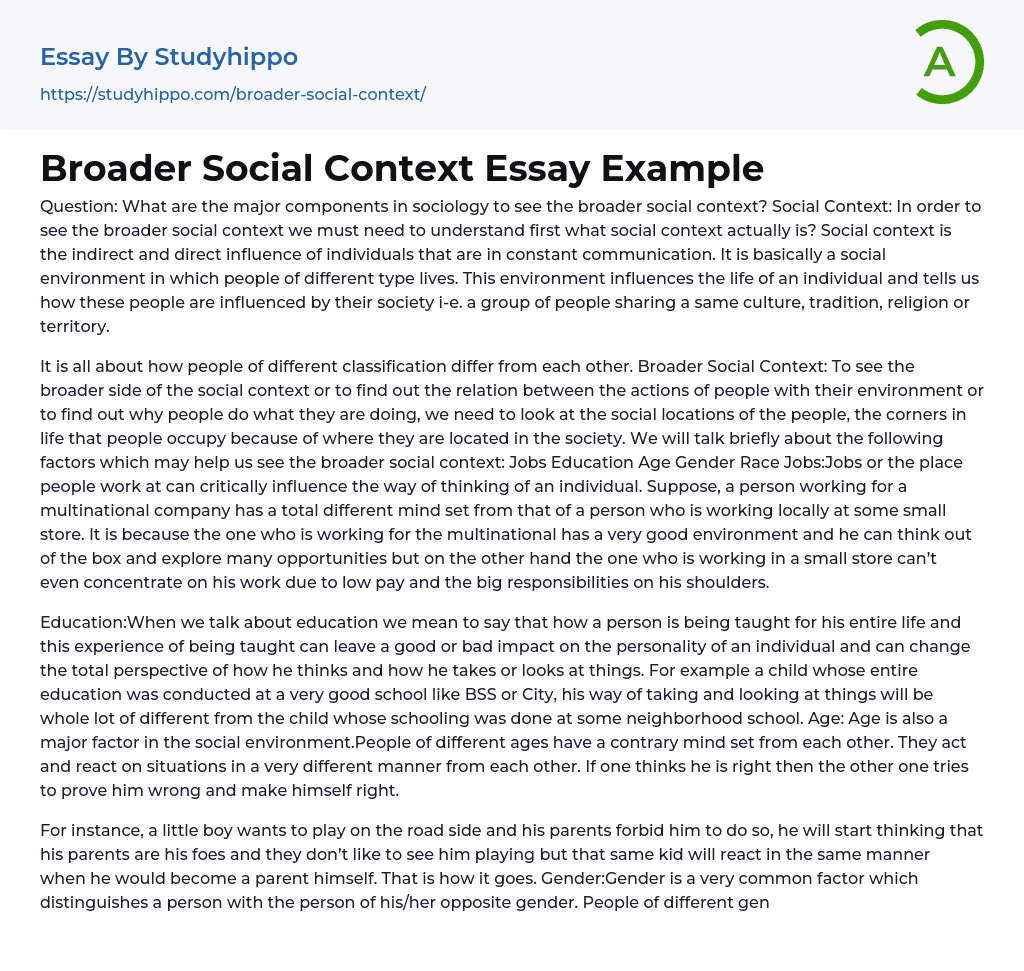Question: What are the major components in sociology to see the broader social context? Social Context: In order to see the broader social context we must need to understand first what social context actually is? Social context is the indirect and direct influence of individuals that are in constant communication. It is basically a social environment in which people of different type lives. This environment influences the life of an individual and tells us how these people are influenced by their society i-e. a group of people sharing a same culture, tradition, religion or territory.
It is all about how people of different classification differ from each other. Broader Social Context: To see the broader side of the social context or to find out the relation between the actions of
...people with their environment or to find out why people do what they are doing, we need to look at the social locations of the people, the corners in life that people occupy because of where they are located in the society. We will talk briefly about the following factors which may help us see the broader social context: Jobs Education Age Gender Race Jobs:Jobs or the place people work at can critically influence the way of thinking of an individual. Suppose, a person working for a multinational company has a total different mind set from that of a person who is working locally at some small store. It is because the one who is working for the multinational has a very good environment and he can think out of the box and explore many opportunities but on the other hand the one who is working
in a small store can’t even concentrate on his work due to low pay and the big responsibilities on his shoulders.
Education:When we talk about education we mean to say that how a person is being taught for his entire life and this experience of being taught can leave a good or bad impact on the personality of an individual and can change the total perspective of how he thinks and how he takes or looks at things. For example a child whose entire education was conducted at a very good school like BSS or City, his way of taking and looking at things will be whole lot of different from the child whose schooling was done at some neighborhood school. Age: Age is also a major factor in the social environment.People of different ages have a contrary mind set from each other. They act and react on situations in a very different manner from each other. If one thinks he is right then the other one tries to prove him wrong and make himself right.
For instance, a little boy wants to play on the road side and his parents forbid him to do so, he will start thinking that his parents are his foes and they don’t like to see him playing but that same kid will react in the same manner when he would become a parent himself. That is how it goes. Gender:Gender is a very common factor which distinguishes a person with the person of his/her opposite gender. People of different genders react upon situations in their own unique ways. Like, women tend to panic and get worried more often
than a man in bad times or difficult situations.
Race: Race is the biggest factor which discriminates members of different races with each other. They have totally different or sometimes opposite cultures, traditions, religions and languages. They think highly of themselves and tend to show that they are better than all the other races in some way or another. This is human psychology.Sociologist Charles Wright Mills put it that way: “The sociological perspective enables us to grasp the connection between history and biography” By using the term history the sociologist is pointing at the events which happened in past with the society and because of this, each society has evolved some different characteristics.
We often think and talk about people’s behaviors as though it were caused by their gender, race or some other similar factors but the sociological perspective helps us escape from this limited personal view by exposing the broader social context that defines human behavior.
- Child essays
- Childcare essays
- Child labor essays
- Doll essays
- Social Construction of Gender essays
- Adoption essays
- Aunt essays
- Babies essays
- Bedroom essays
- Caring essays
- Children essays
- Daughter essays
- Divorce essays
- Dog essays
- Dysfunctional Family essays
- Family Tradition essays
- Family Values essays
- Father essays
- Foster Care essays
- Friends essays
- Grandparent essays
- Home essays
- Hometown essays
- Husband essays
- Jealousy essays
- Love essays
- Marriage essays
- Mother essays
- Online Dating essays
- Parenting essays
- Parenting Teens essays
- Parents essays
- Relationship essays
- Room essays
- Sibling essays
- Sister essays
- Wedding essays
- Wife essays
- Boy essays
- Gay essays
- Gender essays
- Gender Identity essays
- Gender Roles In Society essays
- Gender Stereotypes essays
- Girl essays
- Homosexuality essays
- Human Sexual Behavior essays
- Lgbt essays
- Man essays
- Masculinity essays




